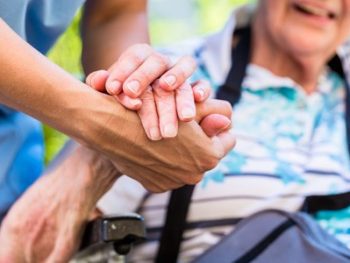Pemi-Baker Community Health is pleased to resume offering its in-person community-based support groups for at-home caregivers. Meeting will be provided at the Boulder Point Conference room of Speare Memorial Hospital in Plymouth.
Caregivers Support Group:
First Wednesday of every month
Starting: Wednesday, August 4, 2021 (11:00am)
Our monthly Caregivers Support Group will begin its in-person offerings on Wednesday, August 4, 2021, at 11:00am. This group will meet in the Conference Room at the Boulder Point site of Speare Memorial Hospital. The challenges of being an at-home caregiver (or even a long-distance one, as in the case of an adult child coordinating the care of a parent from some distance away) can be overwhelming, daunting, and exhausting. The experience naturally alters one’s freedom for social interaction beyond the home, and this reality was exacerbated as we lived through the height of the current pandemic. Although caregiving is an expression of love and concern, the constant vigilance required from the caregiver can be emotionally draining and the stress of it can have physical ramifications. Consequently, self-care is an important quality for caregivers to cultivate.
Connecting with other caregivers can help to lighten the emotional load imposed by this ever-increasing phenomenon that has become a part of contemporary American life as our population ages. We hope this gathering will allow for opportunities of sharing, brainstorming, problem-solving, and supportive listening.
The group will meet on the first Wednesday of each month at 11:00am. As they become available, relevant handouts and other materials will be offered. Participants for this group are also asked to check in per Speare’s current practice and to bring a mask with them for probable use during the group. The group will end by 12:30pm at the latest, depending on the energy of exchange generated by the participants.
Please pre-register the week prior to the meeting by contacting the facilitator: Guy Tillson, PBCH Hospice Spiritual Counselor and Bereavement Counselor, online via email at gtillson@pbhha.org or by phone at 536-2232, x 318. If you would prefer to participate virtually by ZOOM, please indicate that, and we will attempt to accommodate you. Group size is limited to TEN persons, so registrations will be accepted on a “first come, first served” basis.
Written by Guy Tillson, PBCH Hospice Spiritual Counselor and Bereavement Counselor



 The book is THE 36-HOUR DAY: A Family Guide to Caring for People Who Have Alzheimer Disease, Other Dementias, and Memory Loss. The title itself, as does the book, pulls no punches. Providing ongoing care for a person with dementia is time-consuming, emotionally demanding, stressful, and exhausting, so that one’s days feel like they are longer than they are and packed with too much to do and remember.
The book is THE 36-HOUR DAY: A Family Guide to Caring for People Who Have Alzheimer Disease, Other Dementias, and Memory Loss. The title itself, as does the book, pulls no punches. Providing ongoing care for a person with dementia is time-consuming, emotionally demanding, stressful, and exhausting, so that one’s days feel like they are longer than they are and packed with too much to do and remember. In this introductory section, there is a brief presentation raising the question “What Is Dementia?” The book is careful to explore all sides of the challenges of caring for someone with dementia. The authors really walk alongside the readers/caregivers in taking the first steps toward assuming the responsibility of caregiving. Having read the book, I am hard-pressed to discover any stone that has been left unturned. Let me be quick to say that not all dementia patients end up in nursing homes. Caregiving story endings vary from case to case, very much the result of the many factors both patients and caregivers bring to their own unique circumstances.
In this introductory section, there is a brief presentation raising the question “What Is Dementia?” The book is careful to explore all sides of the challenges of caring for someone with dementia. The authors really walk alongside the readers/caregivers in taking the first steps toward assuming the responsibility of caregiving. Having read the book, I am hard-pressed to discover any stone that has been left unturned. Let me be quick to say that not all dementia patients end up in nursing homes. Caregiving story endings vary from case to case, very much the result of the many factors both patients and caregivers bring to their own unique circumstances.

 “Let Food Be Thy Medicine and Medicine Be Thy Food” – Hippocrates. Hippocrates of Kos was a Greek physician of the Age of Pericles, who is considered one of the most outstanding figures in the history of medicine. He is often referred to as the “Father of Medicine.”
“Let Food Be Thy Medicine and Medicine Be Thy Food” – Hippocrates. Hippocrates of Kos was a Greek physician of the Age of Pericles, who is considered one of the most outstanding figures in the history of medicine. He is often referred to as the “Father of Medicine.”





 Starting at the wrist of one hand, let your thumb and fingers of the other hand softly massage the wrist, and then move across the back of the hand, and continue to gently massage each knuckle and joint of each finger. As you finish, use your fingertips to move in a circle in your palm. Then attend to the other hand. You may also want to lightly rub your palms together or even to softly clap your hands. To massage your head, gently let your fingertips move through your hair (or what you have left of it!). Do this a few times. Then gently tap your fingertips throughout and across your whole scalp, not forgetting the areas around your ears or at the base of your skull down to your neck. This also stimulates the movement of energy in our cranial area.
Starting at the wrist of one hand, let your thumb and fingers of the other hand softly massage the wrist, and then move across the back of the hand, and continue to gently massage each knuckle and joint of each finger. As you finish, use your fingertips to move in a circle in your palm. Then attend to the other hand. You may also want to lightly rub your palms together or even to softly clap your hands. To massage your head, gently let your fingertips move through your hair (or what you have left of it!). Do this a few times. Then gently tap your fingertips throughout and across your whole scalp, not forgetting the areas around your ears or at the base of your skull down to your neck. This also stimulates the movement of energy in our cranial area. For the purpose of focusing and directing your attention, only one is necessary. Use it as the daylight is ending. Simply direct your attention to the light, bringing to mind thoughts of past good times and the joy of affection shared with loved ones. The length of time you do this for does not matter too much, but respect the rhythm of your ability to concentrate easily. This isn’t supposed to be a chore or an assignment! It seems to be more profitable to do this in a quiet time without the distraction of other noise. This can be settling to the soul and bring your day to a peaceful end.
For the purpose of focusing and directing your attention, only one is necessary. Use it as the daylight is ending. Simply direct your attention to the light, bringing to mind thoughts of past good times and the joy of affection shared with loved ones. The length of time you do this for does not matter too much, but respect the rhythm of your ability to concentrate easily. This isn’t supposed to be a chore or an assignment! It seems to be more profitable to do this in a quiet time without the distraction of other noise. This can be settling to the soul and bring your day to a peaceful end.

 If a person is feeling tightness, pain, loss of range of motion or strength, or feel like their posture is being impaired, these can be signs identifying the need for physical therapy. Treatment for breast cancer is saving lives. Let us help you with these side effects of breast cancer treatment so you can regain your health in motion!
If a person is feeling tightness, pain, loss of range of motion or strength, or feel like their posture is being impaired, these can be signs identifying the need for physical therapy. Treatment for breast cancer is saving lives. Let us help you with these side effects of breast cancer treatment so you can regain your health in motion!
 condition is or how it manifests itself. The condition can occur when there is a loss of brain cells that produce a chemical called dopamine. The four common symptoms are: tremors, limb and trunk stiffness, the slowing down of movement and weak balance or coordination. About 500,000 people in the U.S. have Parkinson’s disease, with about 50,000 people being diagnosed each year, according to the National Institute of Neurological Disorders and Stroke.
condition is or how it manifests itself. The condition can occur when there is a loss of brain cells that produce a chemical called dopamine. The four common symptoms are: tremors, limb and trunk stiffness, the slowing down of movement and weak balance or coordination. About 500,000 people in the U.S. have Parkinson’s disease, with about 50,000 people being diagnosed each year, according to the National Institute of Neurological Disorders and Stroke. safer movements and improved quality of life.
safer movements and improved quality of life.
 use of adaptive equipment
use of adaptive equipment When you first meet your physical therapist, he or she will assess your balance. If it is impaired due to visual, inner ear or muscular reasons, your physical therapist will give you
When you first meet your physical therapist, he or she will assess your balance. If it is impaired due to visual, inner ear or muscular reasons, your physical therapist will give you















